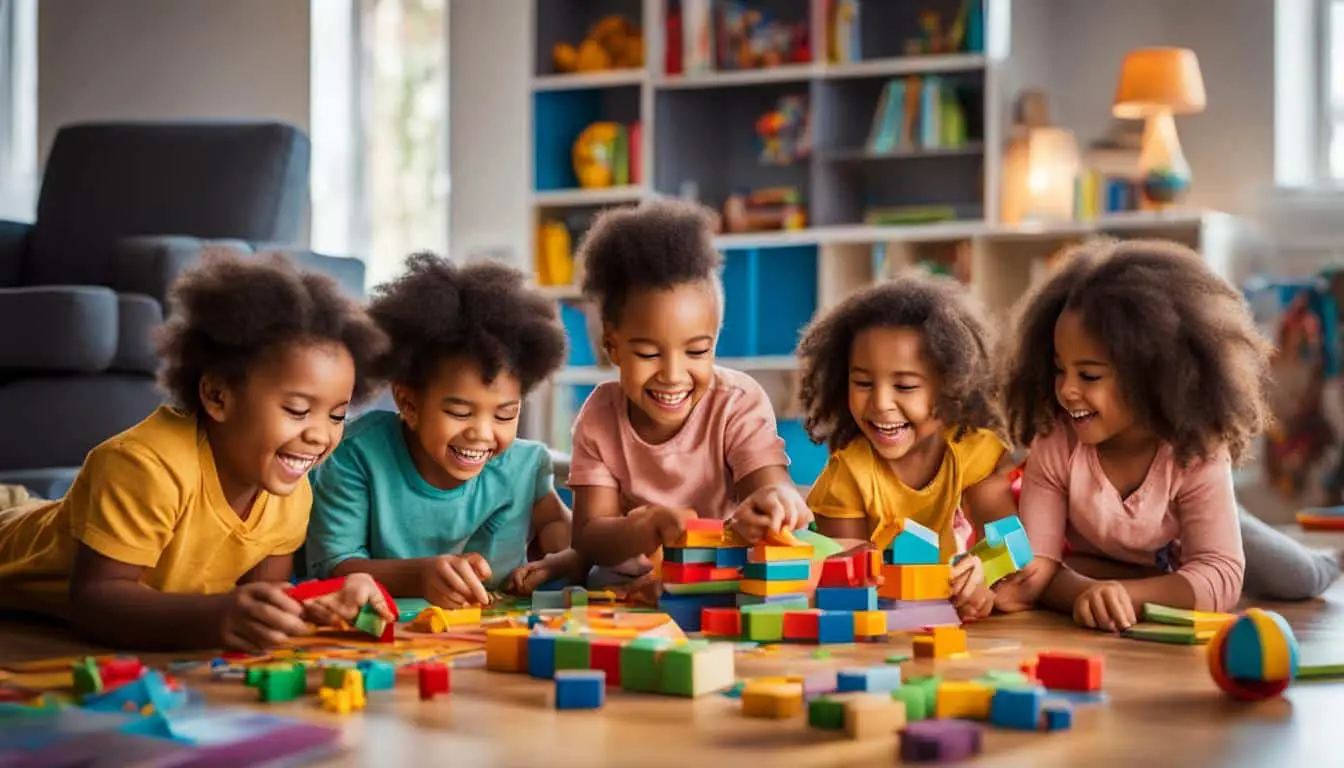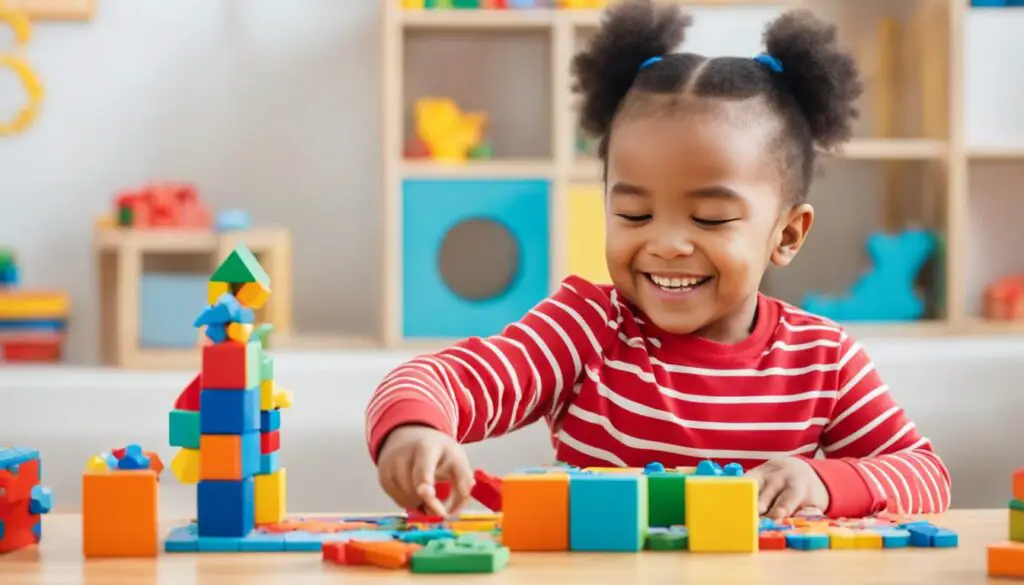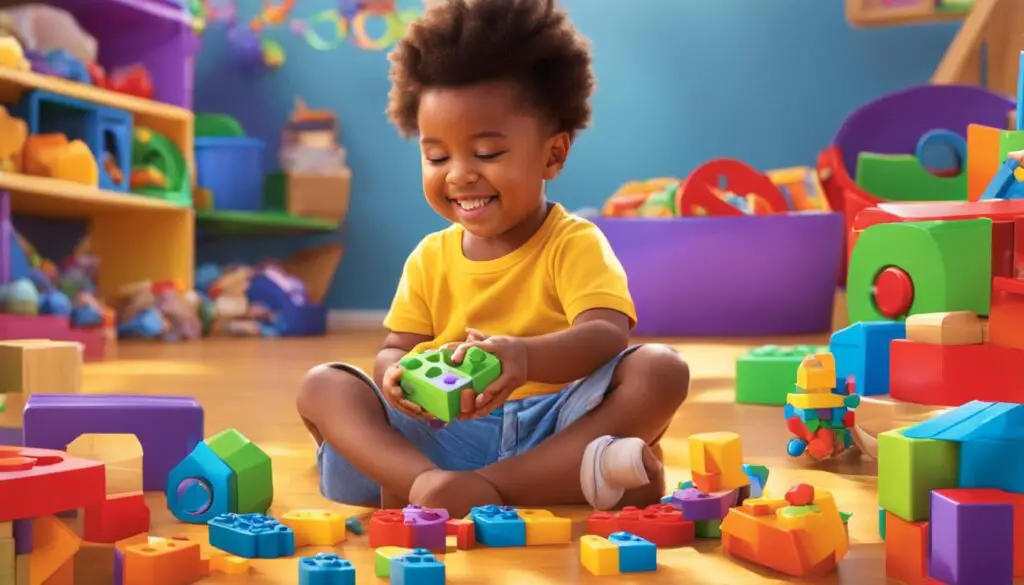
The Impact of Educational Toys on Child Development
As a copywriting journalist, I am excited to share my insights on the importance of educational toys in shaping a child’s early development. Educational toys are critical tools that can help enhance a child’s cognitive, motor, and social-emotional development, laying the foundation for their future learning journey.
Studies have shown that educational toys can significantly impact a child’s development. These toys can provide a rich learning experience that stimulates their creativity, problem-solving skills, and overall cognitive abilities.
Key Takeaways:
- Educational toys play a critical role in shaping a child’s development
- These toys can stimulate a child’s creativity, problem-solving skills, and cognitive abilities
- Child development is enhanced when educational toys are used
- Educational toys provide a rich learning experience for children
- Parents and caregivers can use educational toys to supplement classroom learning
Types of Educational Toys
As parents, caregivers, and educators, we all want to provide the best educational toys that truly benefit children’s development. There are various types of educational toys available in the market, which can be broadly classified into the following categories:
- Cognitive Development Toys – These toys aim to develop problem-solving skills, decision-making ability, and memory retention. Examples include puzzles, memory games, building blocks, and shape sorters.
- Fine Motor Skill Toys – These toys aim to develop and improve the small muscles in a child’s hands and fingers, improving dexterity and hand-eye coordination. Examples include stacking rings, lacing beads, and drawing boards.
- Language Acquisition Toys – These toys aim to enhance communication, vocabulary, and language skills. Examples include alphabet books, talking dolls, and musical instruments.
- Social Skill Toys – These toys aim to promote social skills such as sharing, taking turns, and empathy. Examples include board games, role-playing toys, and dolls.
By providing children with a variety of educational toys that cover these different areas, we can support their holistic development and encourage a love for learning. It is important to note that toys can often fall under multiple categories, making them more versatile in their benefits.
Examples of Educational Toys and their Developmental Benefits
| Educational Toy | Developmental Benefits |
|---|---|
| Stacking Blocks | Improves hand-eye coordination, fine motor skills, and cognitive development. |
| Musical Instruments | Enhances language acquisition, cognitive development, and social skills. |
| Board Games | Promotes social skills, cognitive development, and language acquisition. |
| Art Supplies | Encourages creativity, fine motor skills, and cognitive development. |
“Play is the highest form of research.” – Albert Einstein
Educational toys promote learning through play, allowing children’s curious minds to explore, experiment, and imagine. As we choose educational toys for our children, let’s consider not just their immediate entertainment value but also their potential for long-term developmental benefits.
Benefits of Educational Toys
Educational toys offer numerous benefits beyond mere entertainment value. They can support a child’s growth by stimulating their imagination, creativity, and problem-solving skills.
Moreover, playing with educational toys allows children to learn essential life skills and gain knowledge in various areas. Some of the key benefits of educational toys are:
| Benefits | Description |
|---|---|
| Improves cognitive abilities | Educational toys can enhance a child’s thinking skills, build logic and reasoning abilities, and improve memory and attention span. |
| Encourages social interaction | Playing with educational toys helps children develop social skills such as sharing, taking turns, and collaborating with others. |
| Enhances creativity and imagination | Educational toys can inspire children to explore their imagination, think critically, and express themselves creatively. |
| Improves problem-solving skills | Children learn to analyze and solve problems through trial and error when playing with educational toys. |
The benefits of educational toys extend beyond childhood, as these toys can lay a strong foundation for future learning. For instance, building blocks or puzzles can teach children about problem-solving and spatial relationships, skills that are valuable throughout life.
Overall, incorporating educational toys into a child’s playtime routine can have a long-lasting positive impact on their overall development.

The Role of Educational Toys in Early Childhood Education
Educational toys can significantly impact a child’s learning journey and development, especially during their formative years. These toys not only provide a source of entertainment but also offer an opportunity for young children to learn and grow holistically.
Early childhood education plays an essential role in shaping a child’s future, and educational toys can supplement classroom learning by providing interactive and engaging experiences that support various aspects of a child’s growth.
Through play-based learning, children can develop essential cognitive, social, and emotional skills, which can have a lasting impact on their lives. Educational toys that promote problem-solving, fine motor skills, and language development can contribute significantly to a child’s growth and development in these areas.
Furthermore, these toys also promote independence and self-directed learning, which can be particularly useful in early childhood education. By encouraging children to explore, discover and create, educational toys can foster curiosity and a love for learning that can extend well into later life.

Real-life Example:
A study conducted by the US National Institutes of Health found that children who played with educational toys had significantly higher cognitive scores than children who did not have access to such toys. This highlights the essential role that educational toys play in early childhood education and highlights the importance of ensuring that all children have access to them.
Selecting the Right Educational Toys
Choosing the right educational toy for your child can prove to be a challenging task. However, with careful consideration and research, you can ensure that the toy enhances your child’s developmental needs while providing entertainment and engagement. Here are some tips for selecting the right educational toys:
- Consider age appropriateness: Ensure that the toy is suitable for your child’s age and skill level. Check the recommended age group specified on the packaging to avoid buying toys that are too advanced or basic for your child’s developmental stage.
- Educational value: Look for toys that promote learning and skills development. Choose toys that reinforce your child’s interests and strengths, such as puzzle toys, books, construction sets, or musical instruments.
- Safety: When selecting toys, consider their safety features. Ensure that there are no small parts or potential choking hazards, and that the toy is made from non-toxic materials.
Remember that children’s interests and developmental needs change as they grow. So, it’s crucial to regularly assess the toys and activities that best suit their needs.
By carefully selecting educational toys that align with your child’s interests and needs, you can create an environment that fosters learning and development. The right toy can inspire creativity, improve problem-solving skills and provide opportunities for socialization.
How Educational Toys Impact Different Developmental Areas
Educational toys not only provide entertainment but also play a significant role in the overall development of a child. Let’s explore how these toys impact different aspects of child development:
Cognitive Development
Educational toys can help in building cognitive skills, such as problem-solving, critical thinking, and memory retention. They can improve a child’s mental agility by challenging them to think creatively and outside the box. For example, construction sets like LEGO allow children to experiment with different designs, providing an opportunity for them to use their imagination and problem-solving abilities.
Language and Communication Skills
Language learning can be easily integrated into playtime. Educational toys such as board games and puzzles help develop language and communication skills, as children learn to express themselves and engage in conversation with others. Additionally, toys like LeapFrog’s My Pal Scout, which use voice recognition technology, can help a child learn new words and phrases while having fun.
Social-Emotional Development
Educational toys can provide children with a safe space to learn how to interact with others and develop social skills. Toys that encourage cooperative play, such as kitchen sets or board games, create opportunities for children to learn the importance of sharing, taking turns, and working together. These skills are important for a child’s social-emotional development and can be beneficial in later life.
Physical Coordination
Physical coordination is a crucial aspect of child development. Educational toys that involve movement, such as dance mats, balance beams, and skipping ropes, can help develop gross motor skills and hand-eye coordination. Toys like Etch A Sketch or Magnadoodle can help develop fine motor skills, such as writing and drawing, which are essential for later academic success.
With such a wide range of educational toys available, it’s crucial to choose toys that align with a child’s developmental needs. By selecting toys that stimulate different areas of development, parents and caregivers can help their children reach their full potential and enjoy the benefits of enriched playtime.
Conclusion
In conclusion, as a professional copywriting journalist, I believe that educational toys are an essential tool in shaping a child’s development. Through interactive and engaging play experiences, these toys can impact different areas of a child’s growth, including cognitive development, language and communication skills, social-emotional development, and physical coordination.
Parents and caregivers can select the right educational toys based on their child’s age, developmental needs, and safety considerations. With the right selection of toys, these tools can supplement classroom learning and promote holistic development in young children.
Therefore, it is crucial to recognize the significant impact that educational toys have on a child’s learning journey. As a result, it is essential to integrate educational toys into early childhood education and encourage their use at home. Through the use of educational toys, we can support and enhance a child’s growth, ultimately shaping their learning journey and fostering essential skills that will serve them well for years to come.
FAQ
How do educational toys impact a child’s development?
Educational toys play a crucial role in shaping a child’s development. They provide opportunities for children to engage in hands-on, interactive learning experiences, which can enhance cognitive abilities, promote problem-solving skills, and foster creativity.
What are the different types of educational toys available?
There is a wide range of educational toys available in the market. Some examples include puzzles and building blocks for cognitive development, art and craft kits for creativity, and role-play sets for social skills development.
What specific benefits do educational toys provide?
Educational toys offer various benefits to children. They stimulate imagination and creativity, improve critical thinking and problem-solving skills, enhance language and communication abilities, and encourage social interaction and cooperative play.
How do educational toys supplement early childhood education?
Educational toys complement classroom learning by providing hands-on experiences that reinforce key concepts. They can further encourage independent exploration, support self-directed learning, and deepen understanding of educational concepts introduced in school.
How can parents select the right educational toys for their child?
When selecting educational toys, parents should consider the age appropriateness of the toy, the educational value it offers, and its safety features. It is also essential to choose toys that align with the child’s interests and developmental needs.
In what ways do educational toys impact different areas of child development?
Educational toys have a positive impact on various developmental areas. They promote cognitive development by encouraging problem-solving and critical thinking. They enhance language and communication skills through interactive play. They support social-emotional development by promoting cooperative play and empathy. And they improve physical coordination through activities that involve fine motor skills.